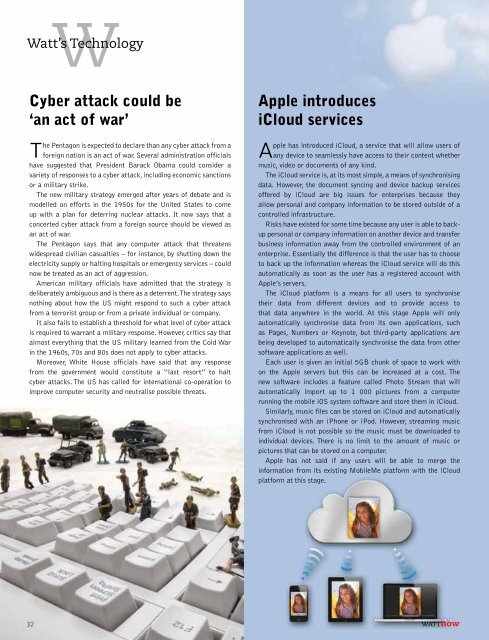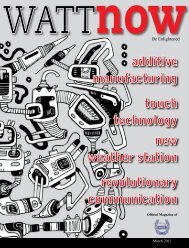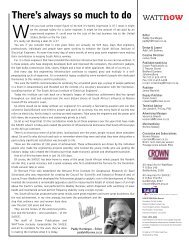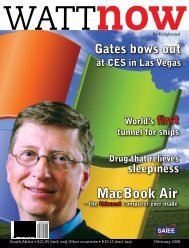download a PDF of the full June 2011 issue - Watt Now Magazine
download a PDF of the full June 2011 issue - Watt Now Magazine
download a PDF of the full June 2011 issue - Watt Now Magazine
Create successful ePaper yourself
Turn your PDF publications into a flip-book with our unique Google optimized e-Paper software.
W<br />
<strong>Watt</strong>’s Technology<br />
Cyber attack could be<br />
‘an act <strong>of</strong> war’<br />
The Pentagon is expected to declare than any cyber attack from a<br />
foreign nation is an act <strong>of</strong> war. Several administration <strong>of</strong>ficials<br />
have suggested that President Barack Obama could consider a<br />
variety <strong>of</strong> responses to a cyber attack, including economic sanctions<br />
or a military strike.<br />
The new military strategy emerged after years <strong>of</strong> debate and is<br />
modelled on efforts in <strong>the</strong> 1950s for <strong>the</strong> United States to come<br />
up with a plan for deterring nuclear attacks. It now says that a<br />
concerted cyber attack from a foreign source should be viewed as<br />
an act <strong>of</strong> war.<br />
The Pentagon says that any computer attack that threatens<br />
widespread civilian casualties – for instance, by shutting down <strong>the</strong><br />
electricity supply or halting hospitals or emergency services – could<br />
now be treated as an act <strong>of</strong> aggression.<br />
American military <strong>of</strong>ficials have admitted that <strong>the</strong> strategy is<br />
deliberately ambiguous and is <strong>the</strong>re as a deterrent. The strategy says<br />
nothing about how <strong>the</strong> US might respond to such a cyber attack<br />
from a terrorist group or from a private individual or company.<br />
It also fails to establish a threshold for what level <strong>of</strong> cyber attack<br />
is required to warrant a military response. However, critics say that<br />
almost everything that <strong>the</strong> US military learned from <strong>the</strong> Cold War<br />
in <strong>the</strong> 1960s, 70s and 80s does not apply to cyber attacks.<br />
Moreover, White House <strong>of</strong>ficials have said that any response<br />
from <strong>the</strong> government would constitute a “last resort” to halt<br />
cyber attacks. The US has called for international co-operation to<br />
improve computer security and neutralise possible threats.<br />
Apple introduces<br />
iCloud services<br />
Apple has introduced iCloud, a service that will allow users <strong>of</strong><br />
any device to seamlessly have access to <strong>the</strong>ir content whe<strong>the</strong>r<br />
music, video or documents <strong>of</strong> any kind.<br />
The iCloud service is, at its most simple, a means <strong>of</strong> synchronising<br />
data. However, <strong>the</strong> document syncing and device backup services<br />
<strong>of</strong>fered by iCloud are big <strong>issue</strong>s for enterprises because <strong>the</strong>y<br />
allow personal and company information to be stored outside <strong>of</strong> a<br />
controlled infrastructure.<br />
Risks have existed for some time because any user is able to backup<br />
personal or company information on ano<strong>the</strong>r device and transfer<br />
business information away from <strong>the</strong> controlled environment <strong>of</strong> an<br />
enterprise. Essentially <strong>the</strong> difference is that <strong>the</strong> user has to choose<br />
to back up <strong>the</strong> information whereas <strong>the</strong> iCloud service will do this<br />
automatically as soon as <strong>the</strong> user has a registered account with<br />
Apple’s servers.<br />
The iCloud platform is a means for all users to synchronise<br />
<strong>the</strong>ir data from different devices and to provide access to<br />
that data anywhere in <strong>the</strong> world. At this stage Apple will only<br />
automatically synchronise data from its own applications, such<br />
as Pages, Numbers or Keynote, but third-party applications are<br />
being developed to automatically synchronise <strong>the</strong> data from o<strong>the</strong>r<br />
s<strong>of</strong>tware applications as well.<br />
Each user is given an initial 5GB chunk <strong>of</strong> space to work with<br />
on <strong>the</strong> Apple servers but this can be increased at a cost. The<br />
new s<strong>of</strong>tware includes a feature called Photo Stream that will<br />
automatically import up to 1 000 pictures from a computer<br />
running <strong>the</strong> mobile iOS system s<strong>of</strong>tware and store <strong>the</strong>m in iCloud.<br />
Similarly, music files can be stored on iCloud and automatically<br />
synchronised with an iPhone or iPod. However, streaming music<br />
from iCloud is not possible so <strong>the</strong> music must be <strong>download</strong>ed to<br />
individual devices. There is no limit to <strong>the</strong> amount <strong>of</strong> music or<br />
pictures that can be stored on a computer.<br />
Apple has not said if any users will be able to merge <strong>the</strong><br />
information from its existing MobileMe platform with <strong>the</strong> iCloud<br />
platform at this stage.<br />
32

















